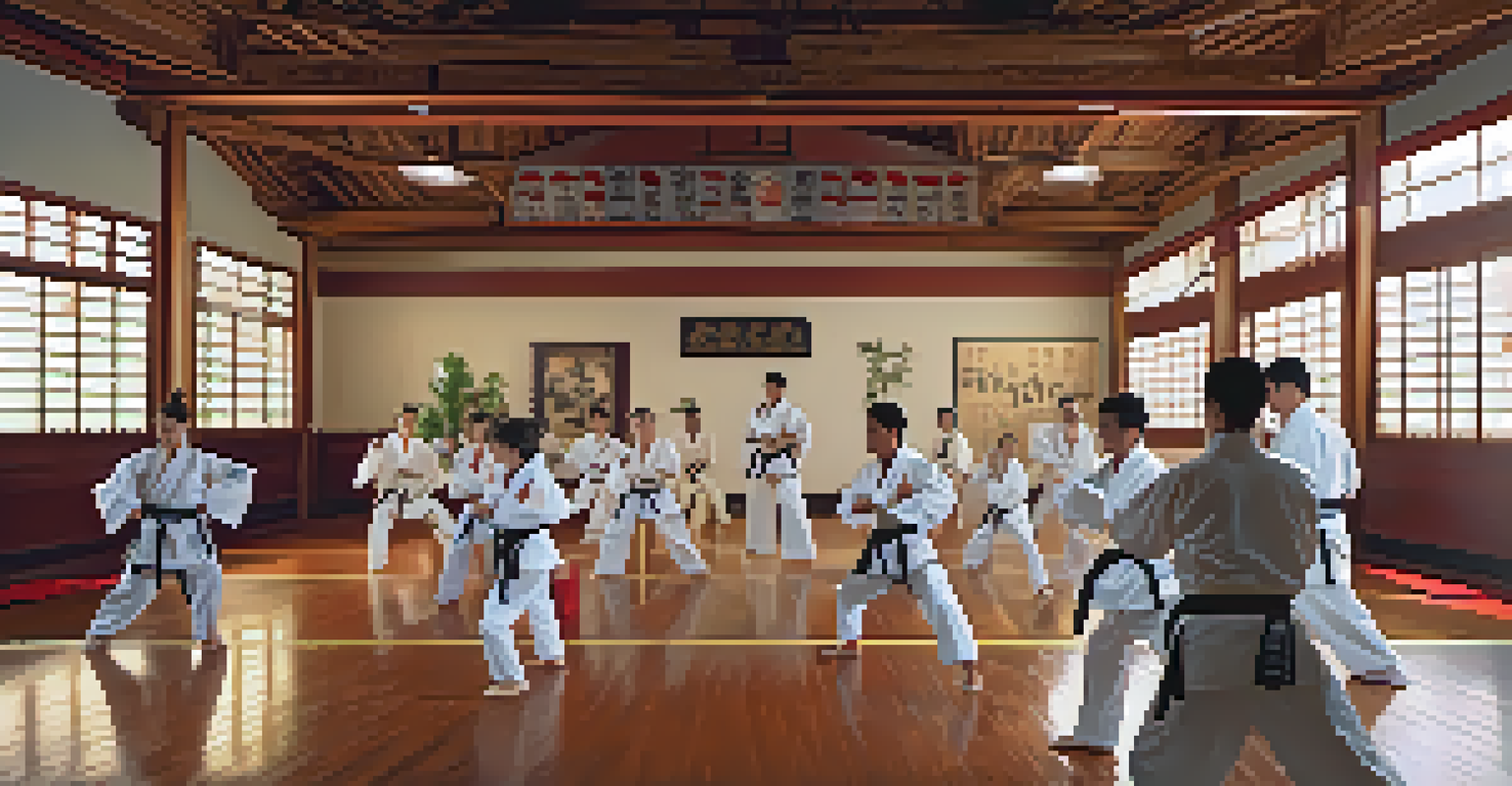Emotional Regulation: A Key to Martial Arts Success

Understanding Emotional Regulation in Martial Arts
Emotional regulation refers to our ability to manage and respond to our emotions effectively. In martial arts, where discipline and focus are crucial, being in control of your emotions can make all the difference. For instance, a student who learns to regulate anxiety before a competition can perform better than one who succumbs to nervousness.
It's not the load that breaks you down, it's the way you carry it.
Practicing emotional regulation helps martial artists deal with pressure, whether it's in training sessions or during competitions. By recognizing their feelings and choosing how to respond, they can maintain a calm and focused mindset. This skill is not only beneficial on the mat but also translates into everyday life, giving practitioners tools to handle stress in various situations.
Furthermore, emotional regulation fosters resilience. When faced with setbacks, such as not landing a technique or losing a match, those who can manage their emotions are more likely to bounce back. They view challenges as opportunities for growth rather than insurmountable obstacles, which ultimately leads to long-term success in their martial arts journey.
The Connection Between Emotions and Performance
Emotions play a significant role in athletic performance, including martial arts. Positive emotions like excitement and confidence can enhance focus and motivation, while negative emotions can lead to distractions and poor performance. Understanding this connection allows martial artists to harness their emotions to improve their skills and achieve their goals.

For example, a fighter who feels confident before a match is more likely to execute techniques effectively and remain composed. On the other hand, fear or frustration can lead to hasty decisions and mistakes. By learning to regulate their emotions, martial artists can create a mental environment that supports peak performance.
Emotional Regulation Enhances Performance
Practicing emotional regulation helps martial artists maintain focus and composure, leading to improved performance in competitions.
Additionally, emotional awareness can help practitioners identify and address any emotional blocks that might hinder their progress. Recognizing when feelings of self-doubt arise allows them to take proactive steps to counteract those thoughts, ensuring they remain focused on their training and goals.
Techniques for Improving Emotional Regulation
There are several effective techniques martial artists can use to enhance their emotional regulation. Mindfulness practices, such as meditation and deep breathing, can help practitioners become more aware of their emotions and learn to process them without becoming overwhelmed. These techniques can be integrated into warm-ups or cool-downs during training sessions.
The greatest weapon against stress is our ability to choose one thought over another.
Visualization is another powerful tool. By imagining themselves in challenging scenarios and practicing their responses, martial artists can prepare emotionally for real-life situations in competitions. This mental rehearsal can help reduce anxiety and boost confidence when it's time to perform.
Finally, journaling can be an excellent way to reflect on emotional experiences during training or competitions. Writing down feelings allows practitioners to process emotions and learn from their experiences, creating a better understanding of how to regulate their responses in the future.
The Role of Coaches in Emotional Regulation
Coaches play a vital role in helping martial artists develop emotional regulation skills. By creating a supportive and understanding environment, coaches can help students feel comfortable expressing their emotions. This openness encourages a culture where emotional struggles are acknowledged and addressed rather than ignored.
Furthermore, coaches can teach athletes specific techniques for emotional regulation during practice. For instance, they might incorporate breathing exercises or visualization techniques into warm-up routines, helping students become more adept at managing their emotions. This guidance can make a significant difference in how athletes approach competitions.
Coaches Foster Emotional Skills
Coaches play a crucial role in helping athletes develop emotional regulation techniques, creating a supportive training environment.
Additionally, coaches can model emotional regulation themselves, demonstrating how to stay calm under pressure. When athletes observe their coaches managing emotions effectively, they are more likely to emulate those behaviors, ultimately fostering a resilient and focused team.
Building a Supportive Training Environment
Creating a supportive training environment is essential for promoting emotional regulation among martial artists. A sense of community where athletes feel safe to express their emotions can lead to better overall mental health and performance. This nurturing space encourages open discussions about feelings and challenges, allowing for shared learning experiences.
Peer support is also a crucial factor. When athletes cheer each other on and offer encouragement, it fosters a positive atmosphere that enhances emotional resilience. Practitioners can share their struggles and successes, creating bonds that strengthen their emotional well-being and motivation to improve.
Moreover, incorporating team-building activities can help strengthen relationships within the group. These activities not only build camaraderie but also teach valuable interpersonal skills that can aid in emotional regulation, making the training environment even more conducive to success.
The Long-Term Benefits of Emotional Regulation
The benefits of emotional regulation extend far beyond the dojo. Martial artists who master these skills often experience improved mental health, as they learn to cope with stress and anxiety effectively. This emotional resilience can lead to a greater sense of well-being and fulfillment in life.
Additionally, the skills learned through martial arts can translate into various areas, such as academics and career endeavors. Individuals who can manage their emotions tend to perform better under pressure, making them more effective in their personal and professional lives.
Long-Term Benefits of Emotional Skills
The skills gained from emotional regulation in martial arts can positively impact mental health, academic performance, and career success.
Ultimately, emotional regulation is a lifelong skill that can foster personal growth and development. As martial artists continue their journey, they carry the lessons of emotional awareness and regulation with them, enriching their lives and the lives of those around them.
Conclusion: Embracing Emotional Regulation for Success
Emotional regulation is a key component of success in martial arts, influencing performance and personal growth. By understanding and managing their emotions, martial artists can enhance their focus, resilience, and overall effectiveness on and off the mat. This crucial skill not only supports their journey in martial arts but also enriches their everyday lives.
As practitioners continue to develop their emotional regulation abilities, they will find themselves better equipped to face challenges and setbacks with a positive outlook. This journey of self-discovery and growth is what makes martial arts a powerful tool for personal development.

Ultimately, embracing emotional regulation opens the door to a more fulfilling martial arts experience, enabling athletes to reach their full potential and achieve their goals. As they learn to navigate their emotions, they become not just better martial artists but also more well-rounded individuals.